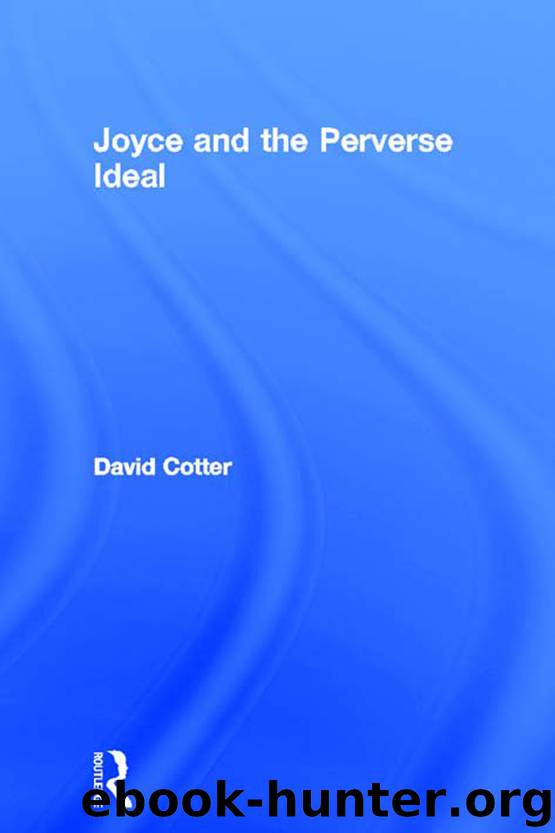Joyce and the Perverse Ideal by Cotter David;

Author:Cotter, David;
Language: eng
Format: epub
Publisher: Routledge
Pull out his eyes,
Apologise,
Apologise,
Pull out his eyes.
Apologise,
Pull out his eyes,
Pull out his eyes,
Apologise.71
(Port., p. 20)
Drawing upon Freud's attempts at explaining the death instinct through repetition, Bersani proposes that art, or a certain type of art, portrays the repetition of thought being developed simply so that it may be cancelled out and rebuilt. In this sense, art reiterates the way in which the being defends itself by giving a portion of itself over to death.
At the outset of his argument in The Freudian Body, Bersani refers to Moran, the hero in the second part of Beckett's Molloy: “during his long crawl home [... ] he was bizarrely preoccupied with such theological questions as: ‘Did Mary conceive through the ear, as Augustine and Adobard assert?’ ‘Is one to approve of the Italian cobbler Lovat who, having cut off his testicles, crucified himself?’”72 Bersani considers the mind in Beckett to expel from the body—like the anus—anonymous and limitless substances that the body both produces and treats like waste. “Thought, far from providing a guarantee of being in this radically non-Cartesian world, is the excrement of being.”73 A similarly obsessive impulse to repetitively set up thought only so that it may be cancelled out, might be seen in Father Flynn:
Sometimes he had amused himself by putting difficult questions to me, asking me what one should do in certain circumstances or whether such and such sins were mortal or venial or only imperfections. His questions showed me how complex and mysterious were certain institutions of the Church which I had always regarded as the simplest acts. (Dub., p. 5)
It is significant that Flynn is here amusing himself, rather than teaching the boy. The links between the two primary meanings of the perverse in Joyce— the religious heretic and the sexual pervert—are made clear in the parallels between Flynn and the pervert in “An Encounter.” The most important of the many parallels between them is their obsessiveness. Flynn heralds Joyce's project of deconstructing the thought that “supersaturates” his mind, from within its own terms, through an artistic and obsessive application of the paradoxically perverse.
When the birdgirl is the only viable sexual object, sexual desire must move into the world she inhabits: the imagination. Once masturbation has established a toehold for imaginative lust in the external world, however, there follows an effort to make the fantasy real, to drag the ideal into immanence. Stephen, walking the streets with the repetitive persistence of a masturbator magnetized by the focus of his desire, longs to see Mercedes manifest herself in the real world (Port., pp. 66–7). Rousseau, jutting his buttocks toward a pack of shocked girls, is very busy in his mind. It is such frantic traversing of the tension between the real and the ideal that will eventually force the birdgirl to manifest herself as Gerty.
The masturbator, however, is spoiled by the sovereignty of the imagination, and therefore unlikely to encounter in the real world an object of desire that will approximate his perverse ideal, until he has discovered how to apply his imagination to cunning, to manipulating the scene.
Download
This site does not store any files on its server. We only index and link to content provided by other sites. Please contact the content providers to delete copyright contents if any and email us, we'll remove relevant links or contents immediately.
Still Me by Jojo Moyes(11266)
On the Yard (New York Review Books Classics) by Braly Malcolm(5525)
A Year in the Merde by Stephen Clarke(5431)
Eleanor Oliphant Is Completely Fine by Gail Honeyman(5282)
The Bookshop by Penelope Fitzgerald(3854)
How Music Works by David Byrne(3272)
Surprise Me by Kinsella Sophie(3113)
Pharaoh by Wilbur Smith(2993)
Why I Write by George Orwell(2955)
A Column of Fire by Ken Follett(2613)
Churchill by Paul Johnson(2587)
The Beach by Alex Garland(2562)
The Songlines by Bruce Chatwin(2557)
Aubrey–Maturin 02 - [1803-04] - Post Captain by Patrick O'Brian(2306)
Heartless by Mary Balogh(2259)
Elizabeth by Philippa Jones(2206)
Hitler by Ian Kershaw(2199)
Life of Elizabeth I by Alison Weir(2086)
Harry Potter and the Cursed Child by J. K. Rowling & John Tiffany & Jack Thorne(2066)
